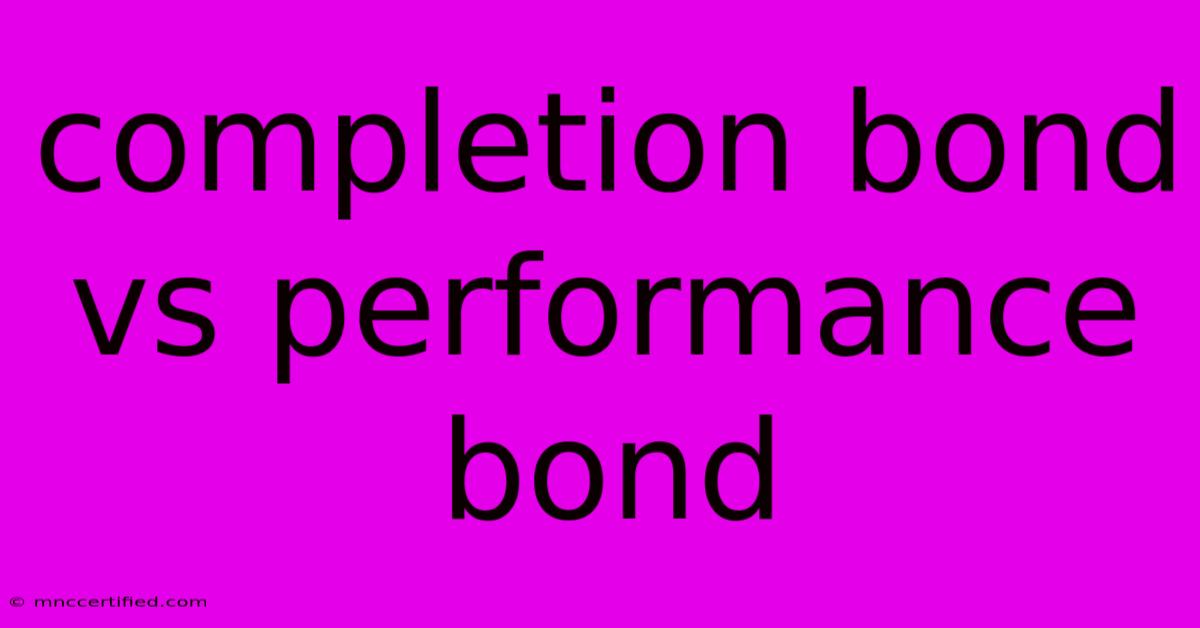Completion Bond Vs Performance Bond

Table of Contents
Completion Bond vs. Performance Bond: What's the Difference?
In the world of construction, bonds are crucial financial instruments that provide security for all parties involved. Two common types of bonds are completion bonds and performance bonds. While they share some similarities, understanding their distinct roles is vital for ensuring a successful project.
What is a Completion Bond?
A completion bond, also known as a completion guarantee, is a financial guarantee provided by a surety company to ensure a project's completion even if the contractor defaults. This bond is designed to protect the owner from financial losses incurred due to the contractor's failure to finish the project.
Key Features of a Completion Bond:
- Guarantees project completion: The surety company is obligated to complete the project or find a new contractor to finish it.
- Protects the owner: This bond provides peace of mind for the owner, ensuring they won't be left with an unfinished project.
- Triggered by contractor default: The bond comes into play only if the contractor fails to complete the project as agreed upon.
What is a Performance Bond?
A performance bond is a financial guarantee issued by a surety company to ensure the contractor's compliance with the project specifications and contractual obligations. This bond is primarily aimed at protecting the owner from defective workmanship or materials.
Key Features of a Performance Bond:
- Guarantees project performance: The surety company will cover the cost of rectifying any defects or non-compliance with project specifications.
- Protects the owner: This bond safeguards the owner from financial losses arising from substandard work.
- Triggered by non-compliance: The bond is activated if the contractor fails to meet the project requirements or fails to perform the work according to the contract.
Key Differences Between Completion and Performance Bonds:
| Feature | Completion Bond | Performance Bond |
|---|---|---|
| Focus | Project completion | Project performance |
| Triggered by | Contractor default | Non-compliance with specifications |
| Coverage | Completing the project | Rectifying defects |
| Typical Use | High-risk projects, projects with limited contractor experience | Standard construction projects, projects with potential quality concerns |
When to Use Which Bond:
- Completion Bond: Use this bond when the project is complex, has a high risk of contractor default, or when the owner wants to minimize their risk of a unfinished project.
- Performance Bond: Use this bond for standard construction projects to ensure that the contractor meets the specified standards and completes the work according to the contract.
Choosing the Right Bond:
The choice of whether to require a completion bond, a performance bond, or both depends on the specific circumstances of the project. Factors to consider include:
- Project complexity
- Contractor's financial stability
- Owner's risk tolerance
- Project specifications
- Industry standards
Conclusion:
Completion bonds and performance bonds offer valuable protection for both owners and contractors in the construction industry. Understanding their distinct roles and choosing the right type of bond for your project can help ensure its successful completion within budget and to the agreed-upon specifications.

Thank you for visiting our website wich cover about Completion Bond Vs Performance Bond. We hope the information provided has been useful to you. Feel free to contact us if you have any questions or need further assistance. See you next time and dont miss to bookmark.
Featured Posts
-
Tesla Stock Surges 9 On Post Election Rally
Nov 12, 2024
-
Camilla On King Charles In New Documentary
Nov 12, 2024
-
Musk Trump Alliance Boosts Tesla Stock
Nov 12, 2024
-
How To Use Olaplex Bonding Oil No 7
Nov 12, 2024
-
Inter Miami Loses Playoff Beckham Disappointed
Nov 12, 2024